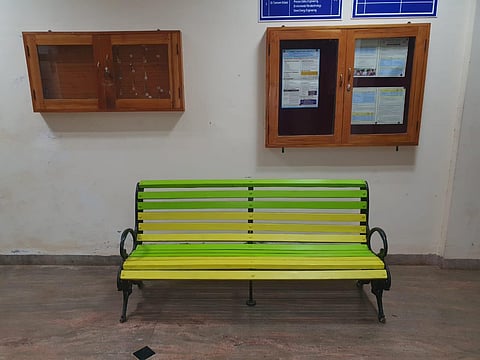

PUDUCHERRY: The Centre for Pollution Control and Environmental Engineering (CPCEE), Pondicherry University, has launched a three-seater chair made out of plastic waste, multi-layered packaging (MLP) and sand.
The product is an outcome of research by CPCEE in collaboration with the Metro group of companies, according to a university release. The actual experiment was performed with a laboratory furnace and scaled in the Metro group of companies’ workshop specialising in manufacturing equipment for recycling, said Assistant Professor S Sudalai from the CPCEE. Sudalai had initiated the process of design and creation of a chair in collaboration with D Azaganandam from the Metro group of companies.
The base material for the chair was plastic waste such as bottles, wrappers, carry bags, straws, used pens, brushes, covers etc., collected from the Pondicherry University campus, coastal clean-up programme and other sources. The plastic waste was segregated, washed, pelleted and thermally treated with the soil of required amount to mould the mixtures into strips for the chair. Several trials were conducted with different proportions to confirm the material strength, he said. The process required minimal optimisation to overcome the limitation from the emissions.
The recycling of plastic waste helps single-use plastic manufacturers find alternative businesses. Further, establishing the recycling process at Puducherry will reduce the waste routed to co-processing. Minimising the usage of the metal in furniture limits the possible corrosion problems in the coastal regions. The addition of fire retardant and soil in the plastics mixtures ensures decent resilience on fire safety, he said. Many customised shapes like traffic barricades, dividers, shelves, tiles, partition walls, paver blocks, and bricks can be prepared from processed waste plastic. Earlier, the paver block made out of plastic waste was displayed before the state level advisory board committee for the implementation of solid waste management rules. These plastic chairs and paver blocks can be installed in public places like beaches and parks. He requested the government to support the recycling products and to create space for the promotion.
This method of recycling extended the life of plastics reaching the dumpsite and prevents it from littering the sea and harming marine life. The addition of MLPS in the fabrication will encourage rag pickers to collect it. All the informal sectors involved in the solid waste management will be benefited because of recycling, he said.
This chair was launched at a two-day workshop organised by CPCEE and the Rajiv Gandhi National Institute of Youth Development, Ministry of Youth Affairs and Sports, on the topic “Waste wise cities for achieving sustainable development goals- Opportunities and Challenges”. R Smita, Director (DST&E) Member Secretary PC& ST, N Ramesh, Senior Environmental Engineer, DSTE, Rajeev Jain, Director, Directorate of Culture and Cultural Relations, Pondicherry University, S Gajalakshmi, Head(i/c) CPCEE, experts from various institutions including government officials, private companies and academicians from all over the country shared their knowledge on sustainable practices on solid waste management.